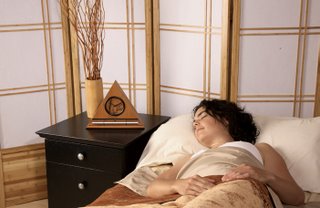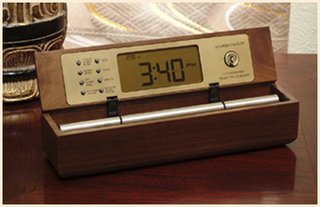|
 Secure Site
Secure Site
|
 |
Archive for the 'Chime Alarm Clocks' Category
 meditation for relaxation It’s no surprise that being consumed with anger can bring on a headache. But worse than expressing your ire is not expressing it. According to researchers at the St. Louis University School of Medicine, bottling up rage may play a bigger role in head pain than anyone ever imagined. Psychologist Robert Nicholson asked 422 people various questions meant to uncover their headache triggers, and the answers pointed to one thing: “Holding in anger was the most important emotional factor in whether or not they were going to experience headaches,” says Nicholson. Why does allowing your frustration to fester bring on the pain? “I wish I had a good answer,” Nicholson says. “We’re getting research underway to figure out the physiology behind it. Muscle tension probably plays a role, but some people think there’s also some interaction of the emotional component of the brain with pain receptors.” Whatever those pathways turn out to be, the answer isn’t just to let anger fly but to figure out ways to keep it from eating away at you. Experts advise learning relaxation techniques, such as deep breathing, yoga, meditation, or biofeedback. You might also want to see a therapist who can help you learn healthy ways to express your anger. Your head—and your friends—will thank you.
adapted from Natural Solutions, October 2003
Although meditation can be done in almost any context, practitioners usually employ a quiet, tranquil space, a meditation cushion or bench, and some kind of timing device to time the meditation session. Ideally, the more these accoutrements can be integrated the better. Thus, it is conducive to a satisfying meditation practice to have a timer or clock that is tranquil and beautiful. Using a kitchen timer or beeper watch is less than ideal.
And it was with these considerations in mind that we designed our digital Zen Alarm Clock and practice timer. This unique “Zen Clock” features a long-resonating acoustic chime that brings the meditation session to a gradual close, preserving the environment of stillness while also acting as an effective time signal.
 Meditation Timers with Chime, a natural acoustic sound not electronic Now & Zen – The Zen Meditation Timer Store
1638 Pearl Street
Boulder, CO 80302
(800) 779-6383
Posted in Chime Alarm Clocks
 How to feel more compassionate Maitryadisu balani
The cultivation of friendliness creates inner strength. (Yoga Sutra III.24)
We typically think of our emotional range as something that is fixed and unchanging—a reflection of the personality we’re born with. But research is revealing the possibility that we may be able to cultivate and increase our ability to feel the emotional state of compassion. Researchers have found that feeling connected to others is as learnable as any other skill. “We are trying to provide evidence that meditation can cultivate compassion, and that you can see the change in both the person’s behavior and the function of the brain,” Lutz says.
So what does compassion look like in the brain? To find out, Lutz and his colleagues compared two groups of -meditators—one group whose members were experienced in compassion meditation, and the other a group whose members were not—and gave them the same instructions: to generate a state of love and compassion by thinking about someone they care about, extend those feelings to others, and finally, to feel love and compassion without any specific object. As each of the participants meditated in-side the fMRI brain scanners, they were occasionally interrupted by spontaneous and unexpected human sounds—such as a baby cooing or a woman screaming—that might elicit feelings of care or concern.
All of the meditators showed emotional responses to the sounds. But the more experienced compassion meditators showed a larger brain response in areas important for processing physical sensations and for emotional responding, particularly to sounds of distress. The researchers also observed an increase in heart rate that corresponded to the brain changes. These findings suggest that the meditators were having a genuine empathic response and that the experienced meditators felt greater compassion. In other words, compassion meditation appears to make the brain more naturally open to a connection with others.
These meditation techniques may have benefits beyond the experience of spontaneous compassion. A study by psychology professor Barbara Fredrickson and her colleagues at the University of North Carolina, Chapel Hill, and the University of Michigan, found that a seven-week lovingkindness meditation course also increased the participants’ daily experience of joy, gratitude, and hope. The more participants meditated, the better they felt. Participants also reported a greater sense of self-acceptance, social support, purpose in life, and life satisfaction, while experiencing fewer symptoms of illness and depression. This study provides strong evidence that chipping away at the illusion of separation can open us up to a far more meaningful connection to life.
adapted from Yoga Journal, by Kelly McGonigal
Use our unique “Zen Clock” which functions as a Yoga & Meditation Timer. It features a long-resonating acoustic chime that brings your meditation or yoga session to a gradual close, preserving the environment of stillness while also acting as an effective time signal. Our Yoga Timer & Clock can be programmed to chime at the end of the meditation or yoga session or periodically throughout the session as a kind of sonic yantra. The beauty and functionality of the Zen Clock/Timer makes it a meditation tool that can actually help you “make time” for meditation in your life. Bring yourself back to balance.
 Zen Timers and Gentle Alarm Clocks Now & Zen – The Chime Timer Store
1638 Pearl Street
Boulder, CO 80302
(800) 779-6383
Posted in Chime Alarm Clocks, intention, Meditation Timers, Meditation Tools, mindfulness practice, Now & Zen Alarm Clocks, Well-being, zen, Zen Timers
 set your zen timer for a mini-meditation Memorize a three-to-five-word phrase, a mantra, that will bring you back to center when things get rough, such as “I am strong” or “Spirit will guide me.” Also, keep a peaceful image mentally on hand (a beach scene, a quiet forest) to call up in stressful moments. Set your Digital Meditation Timer with Chime for 5 minutes and sit silently repeating your phrase until the calming chime sounds.
adapted from Body + Soul Magazine
 digital timers for meditation and yoga with chime Now & Zen – The Meditation Timer Store
1638 Pearl Street
Boulder, CO 80302
(800) 779-6383
Posted in Chime Alarm Clocks, intention, Meditation Timers, Meditation Tools, mindfulness practice, Well-being, Zen Timers
Research published in the last two years shows that certain slow activities–like gentle yoga or gardening–can reduce your stress level and blood pressure and improve your body’s ability to regulate sugar. Past studies have shown that other habits like meditation can help reduce chronic pain and enhance mental clarity. The first step to finding “slowness”is to clear some room in your life–watch less TV or spend less time browsing at the mall. “Jettison the clutter that clogs up your schedule,” says Carl Honoré, author of In Praise of Slowness (HarperOne, 2004). “When you focus on the things that are important at work or at home you can enjoy those things more,”he says. You can also take a more relaxed approach to the things you already do and adopt new habits that require mindfulness. “It’s one thing to say you’re going to slow down, but a slow hobby helps you put those words into practice,” says Honoré. To get you started we’ve come up with seven ways to destress and reenergize.
 gardening is a great mindfulness practice that cultivates stillness of mind 1. Become a Gardener
Caring for flowering plants may help you relax and get grounded. In 2004, researchers at Japan’s Utsunomiya University found repotting plants lowered fatigue and promoted physiological relaxation in study participants, and that working with flowers seemed to have a stronger positive effect than working with nonflowering plants.
HEALTH BENEFITS Research shows that exposure to plants–and even just looking at them–can reduce blood pressure, increase concentration and productivity, and help you recover from illness, says Andy Kaufman, Ph.D., assistant professor of tropical plant and soil sciences at the University of Hawaii in Honolulu. He cites a classic 1984 study, published in Science, which showed that even the view of a green garden helped surgical patients recovering from gall bladder surgery. Among a group of 46 patients in a Pennsylvania hospital, the 23 who had rooms with windows facing greenery had shorter postoperative stays and needed fewer pain–relieving analgesics than the 23 whose windows faced a brick wall.
GETTING STARTED If you live in an apartment or don’t have much room to garden, invest in the EarthBox (earthbox.com), a self–watering container garden that comes with potting soil and fertilizer. “Even if you have a brown thumb, you can grow things [in it],”says David Ellis, American Horticulture Society spokesperson. You could also join a community garden; visit ahs.org, the American Horticulture Society’s website, for more info.
 yoga helps to slow us down 2. Practice Slow Yoga
Slow yoga emphasizes one drawn–out breath for each movement you make. Like tai chi, it uses many repetitive flowing moves. “When you practice slow yoga, you create more awareness between mind and body,”says Beth Shaw, founder of Yoga Fit Training Systems in Los Angeles. This creates a deep sense of stillness and helps develop patience and lower stress, she adds.
HEALTH BENEFITS Last year, researchers in Sweden and India showed that practicing yoga can reverse the negative effects of high blood pressure, obesity, and high blood sugar. The studies, published in the journal Diabetes Research and Clinical Practice, showed reduced waist circumference, blood pressure, blood sugar, and triglycerides (the chemical form of fat cells) and higher HDL (so–called good cholesterol) levels in a control group that practiced yoga versus a placebo group.
GETTING STARTED To find a Slow Yoga class near you visit yogafit.com or inquire at your local yoga studio. You might also consider restorative or yin yoga, two other gentle forms of the practice.
 Take a nap 3. Take a Nap
You snooze, you win, according to a Harvard study published last year in The Archives of Internal Medicine. Researchers revealed that people who regularly napped at least three times a week for an average of 30 minutes had a 37 percent lower risk of heart attack than those who didn’t nap. “It shows that napping is an important preventive strategy just like regular exercise, eating right, and not smoking,”says Sara C. Mednick, Ph.D., author of Take a Nap! Change Your Life (Workman, 2006).
HEALTH BENEFITS A daily nap also boosts serotonin, says Mednick, which may lead to improved memory and performance. Napping can even contribute to weight loss, according to a study in the American Journal of Physiology, Endocrinology, and Metabolism in 2007. That study looked at hormone levels in 41 men and women who were part of a seven–day sleep–deprivation experiment. Those allowed to nap for two hours following a night without any sleep showed a significant drop in cortisol, a hormone related to high levels of stress, and a complement of growth hormone, which helps regulate insulin and fat storage. Researchers concluded that a midafternoon nap improves alertness and performance and reverses the negative metabolic effects of sleep loss.
GETTING STARTED The best time to nap is between 1 p.m. and 3 p.m., but a 15– to 20–minute power nap at any time can help. Set your Zen Alarm Clock for 20 minutes. Close the office door and take a snooze, or find a quiet place where you feel safe. Nap on weekends, Mednick says. “Just don’t use the weekend to catch up on sleep lost in the week.”Check with your doctor about napping if you’re being treated for insomnia.
4. Start a Slow Hobby
 learning to paint Hobbies that require mindful, solitary activity–such as knitting, painting, sculpting, crocheting, or quilting–can act as a brake on your hectic pace.
HEALTH BENEFITS “Slow hobbies help you cultivate the lost art of concentration and being in the moment. They have a meditative quality to them,”says author Carl Honorè. “And that calming effect goes beyond the act itself. Maintaining that inner stillness enables you to negotiate the fast–moving waters of the rest of your day.”
GETTING STARTED Sixty–four percent of people who knit or crochet say they use these crafts to help them reduce stress and relax, according to the Craft Yarn Council of America. Visit craftyarncouncil.com for information. To learn about drawing, visit drawspace.com. Check with a local college or community center for other craft classes.
5. Eat Slowly
Eating too fast creates stress in the body, says nutritionist Marc David, author of The Slow Down Diet (Healing Arts Press, 2005). That causes a spike in cortisol and insulin, which in turn diminishes your ability to burn calories and makes you more likely to gain weight. Eating quickly also leads to overeating. “The brain demands more food if it doesn’t have time to register its needs for taste, aroma, and satisfaction,”says David.
HEALTH BENEFITS Taking time to eat creates a relaxation response, which means you’ll have fewer digestive complaints and your body will be able to take in the nutrients it needs. Plus “we make better food choices, and we know when to stop,”he adds.
GETTING STARTED To ease the pace, double the time you spend on your meals; for example, if you usually eat breakfast in five minutes, stretch it out to ten. “Focus on your food: Taste it, enjoy it, notice it, savor it,”says David. “Find relaxed time between bites by slowing down your internal conversation. Let go of any sense of urgency, and allow the moment to be sensual.”The cooking process can help you slow down too, says David. “Instead of microwaving something, make a soup from scratch.”
6. Do One Thing at a Time
A lot of us believe we get more done by multitasking. But research at the University of Michigan published in the Journal of Experimental Psychology in 2001, shows the opposite is true. “If you concentrate on one task at a time, you get more done faster and make fewer mistakes,” says David E. Meyer, director of the Brain, Cognition, and Action Laboratory at the University of Michigan.
HEALTH BENEFITS Taking on chores one at a time reduces chronic stress and protects your short–term memory, which comes under fire if the brain is overtaxed.
GETTING STARTED To curb outside distractions and focus better, set aside time when you can concentrate on one activity from start to finish. For example, check e–mail once an hour and turn off your instant messaging; let your phone messages go to voice mail and only check them occasionally throughout the day.
 practice meditation in order to slow down 7. Meditate
“Meditation teaches us to focus,”says Steven Hartman, director of professional training at the Kripalu Health and Yoga Center (kripalu.org) in Stockbridge, Mass. “All day your mind is chattering. When you meditate, you can hear your own inner wisdom.”
HEALTH BENEFITS Studies have shown that practicing meditation also improves blood pressure, fortifies the immune system, and promotes a sense of well–being. “A daily meditation practice can bring body, breath, mind, and spirit into balance,”says Hartman.
GETTING STARTED Check out a program like Transcendental Meditation. (See tm.org.) Or begin at home: “Put an egg timer on and stay with your breath for just two and a half minutes,”says Hartman. “Keep your spine tall and straight and allow the breath to be natural.”If you’re seated on the floor, a cushion can raise your pelvis and bring your spine into a natural position. As you get comfortable with the practice, you can increase your time to 15 or 30 minutes a day.
adapted from Natural Health Magazine, by Chrystle Fiedler
One of the ultimate Zen like experiences is waking-up from a great slumber refreshed and energized. Your mind and body are harmoniously one, both alert and focused. Having a refreshed mind and body are two keys to a natural and Zen lifestyle. Waking up in the morning should not be a loud and abrupt awakening, but rather it should be a peaceful positive experience. The right natural alarm clock can transition your deep and tranquil sleep into a serene start to consciousness. Imagine a long-resonating Tibetan bell-like chime waking you up to a beautiful morning experience.
The right alarm clock can be the most beneficial investment for you. With our Now & Zen natural alarm clock you are awakened more gradually and thus more naturally. Now & Zen is focused on creating a naturalistic lifestyle, and our clocks are an example of our philosophy.
 Zen Meditation Timers with Soothing Chime Now & Zen – Soothing Chime Alarm Clock & Timer Store
1638 Pearl Street
Boulder, CO 80302
(800) 779-6383
Posted in Chime Alarm Clocks, intention, Meditation Timers, Meditation Tools, mindfulness practice, Natural Awakening, Now & Zen Alarm Clocks, sleep, Sleep Habits, wake up alarm clock, Well-being, yoga, Yoga Timer, Yoga Timers by Now & Zen, Zen Alarm Clock, Zen Timers
 Early Morning Grogginess Reduced by Gradual Awakening - Ukiyo-e Print by Kitagawa Utamaro Boulder, Colorado—an innovative company has taken one of life’s most unpleasant experiences (being startled awake by your alarm clock early Monday morning), and transformed it into something to actually look forward to. “The Zen Alarm Clock,” uses soothing acoustic chimes that awaken users gently and gradually, making waking up a real pleasure.
Rather than an artificial recorded sound played through a speaker, The Zen Clock features an alloy chime bar similar to a wind chime. When the clock’s alarm is triggered, its chime produces a long-resonating, beautiful acoustic tone reminiscent of a temple gong. Then, as the ring tone gradually fades away, the clock remains silent until it automatically strikes again three minutes later. The frequency of the chime strikes gradually increase over ten-minutes, eventually striking every five seconds, so they are guaranteed to wake up even the heaviest sleeper. This gentle, ten-minute “progressive awakening” leaves users feeling less groggy, and even helps with dream recall.
 Dark Oak Zen Alarm Clock with Chime What makes this gentle awakening experience so exquisite is the sound of the natural acoustic chime, which has been tuned to produce the same tones as the tuning forks used by musical therapists. According to the product’s inventor, Steve McIntosh, “once you experience this way of being gradually awakened with beautiful acoustic tones, no other alarm clock will ever do.”
Zen Alarm Clocks, made by Now & Zen, Inc., come in a variety of shapes and sizes. Now & Zen’s complete line of natural lifestyle products can be seen at: (www.now-zen.com), or by calling the company at (800) 779-6383 to request a catalog.
 The Gradual Chime Alarm Clock Store Now & Zen – The Gradual Chime Alarm Clock Store
1638 Pearl Street
Boulder, CO 80302
(800) 779-6383
Posted in Chime Alarm Clocks, Natural Awakening, Now & Zen Alarm Clocks, Progressive Awakening, Sleep Habits, Zen Clocks and Dream Recall
 progressive chime clock can help reduce stress and help avoid lack of sleep Although the occasional all-nighter is OK, people who regularly skimp on z’s can’t undo sleep deprivation’s detrimental effects by simply sleeping later on on weekends, says a new study in the journal Science of Translation Medicine. Contrary to popular belief, the energy you feel after a Saturday morning sleep session is only short lived, according to the study. Chronic sleep loss has a cumulative effect on performance. Why? Lack of sleep raises levels of the stress hormone cortisol and affects a person’s ability to respond to stimuli, says Catherine Darley, ND, founder of Seattle’s Institute of Naturopathic Sleep Medicine. Sleep also plays a key role in mood regulation and overall physical and mental functioning. If you need some extra help falling asleep, try a natural insomnia supplement made with melatonin, tryptophan, or valerian. Inquire at your local health food store.
 Progression Alarm Clocks for a Gradual Awakening When you have found the perfect routine for falling asleep remember to wake yourself gently so that you can start the day with grace. Set your Zen Alarm Clock 10 minutes earlier than you need to get up so that you can slowly awken in the morning. The Zen Alarm Clock’s long-resonating Tibetan bell-like chime makes waking up a beautiful experience — its progressive chimes begin your day with grace. When the Clock’s alarm is triggered, the acoustic chime bar is struck just once … 3-1/2 minutes later it strikes again … chime strikes become more frequent over 10 minutes … eventually striking every 5 seconds until shut off (see the chime progression graph, below). As they become more frequent, the gentle chimes will always wake you up — your body really doesn’t need to be awakened harshly, with a Zen Clock you’re awakened more gradually and thus more naturally.
adapted from Natural Solutions Magazine, May 2004 by Leslie Crawford
 Chime Alarm Clock - Progressive Wake-Up Clock with Natural Acoustic Chime Now & Zen – Progressive Alarm Clock Shop
1638 Pearl Street
Boulder, CO 80302
(800) 779-6383
Posted in Bamboo Chime Clocks, Chime Alarm Clocks, Japanese Inspired Zen Clocks, sleep, Sleep Habits
 How to Create a Stress-Free Life Kathleen Hall is one of the nation’s noted experts on stress management — she’s consoled Katrina survivors, counseled victims of domestic abuse, and advised families in hospitals coping with cancer and AIDS. But she didn’t always hold this title.
More than 20 years ago, Hall was a successful stockbroker on Wall Street, with a supportive husband and two healthy children. But the late nights, high-stakes pressure, and stressful commute wore at her over the years, until one day she snapped. She quit her job, retreated for six months to a remote cabin in Clarksville, Georgia, and spent the next seven years pursuing degrees in divinity and spirituality.
On her journey to a stress-free life, here’s what she learned.
Hall adopted a powerful but surprisingly simple mantra — SELF, an acronym for serenity, exercise, love, and food — and started teaching it to others to great effect. These “four roots of real happiness” may seem almost too easy, but she insists they have a centering effect in even the worst of circumstances.
Making time for serenity creates space in our lives for meditation and stress reduction; exercise benefits the spirit and mind as well as the body; love and friendship bring physiological and emotional rewards; and nourishing food, consciously consumed, feeds the senses in a deeply satisfying way.
It’s these simple things that keep us balanced, she says, and they make up Hall’s 10 secrets to a stress-free life.
One of the ultimate Zen like experiences is waking-up from a great slumber refreshed and energized. Your mind and body are harmoniously one, both alert and focused. Having a refreshed mind and body are two keys to a natural and Zen lifestyle. Waking up in the morning should not be a loud and abrupt awakening, but rather it should be a peaceful positive experience. The right natural alarm clock can transition your deep and tranquil sleep into a serene start to consciousness. Imagine a long-resonating Tibetan bell-like chime waking you up to a beautiful morning experience.
The right alarm clock can be the most beneficial investment for you. With our Now & Zen natural alarm clock you are awakened more gradually and thus more naturally. Now & Zen is focused on creating a naturalistic lifestyle, and our clocks are an example of our philosophy.
adapted from Body + Soul Magazine
 Natural Sounding Alarm Clocks and Meditation Timers, The Digital Zen Alarm Clock in Solid Walnut Now & Zen – The Zen Alarm Clock Store
1638 Pearl Street
Boulder, CO 80302
(800) 779-6383
Posted in Beauty, Chime Alarm Clocks, intention, Meditation Timers, Meditation Tools, Natural Awakening, nature, wake up alarm clock, Well-being
 The Perfect Sleep Routine Includes Setting your Zen Alarm Clock Anxiety is one of the main causes of insomnia and sleep disruption: When you think about something stressful while lying in bed, it’s harder for your body to relax and drift off to dreamland — and this nightly pattern only gets worse as your brain and body learn to dread bedtime.
You may also be deliberately robbing yourself of much-needed rest by staying up too late or rising too early: Most of us need seven to nine hours of sleep a night, but many overscheduled and overworked adults regularly get by on less. Skimping on sleep can cause fatigue and attention problems, and increase your risk of disease.
Tips for Avoiding Lack of Sleep
Morning/Afternoon
At lunchtime, choose wisely: An animal study published in the journal Cell Metabolism in November 2007 linked a high-fat diet with a disrupted circadian clock. At least three hours before bed, get some exercise that raises your heart rate. “Aerobic exercise in the late afternoon — even just walking home from work — can help you burn off the stress of the day and raise your body temperature,” Walsleben explains. “This has the potential to deepen your sleep later on.” Also, avoid taking siestas during the day to help maintain your sleep drive.
Evening
Eat dinner several hours before bed to give your body time to digest, and avoid spicy or heavy foods if you’re prone to heartburn. If you drink wine or beer, do so “three or four hours away from bedtime,” advises Walsleben; while alcohol may speed the onset of sleep, it can disrupt the sleep cycle later.
Night
Avoid watching intense TV shows, paying bills, or engaging in other stimulating activities an hour or two before bedtime. Instead, dim the lights to stimulate the release of melatonin and do a few relaxing yoga poses (such as Legs Up the Wall and Child’s Pose) or 10 minutes of deep breathing or meditation. Be sure to set your Zen Alarm Clock for your meditation practice. If you have a bathtub, use it. ( Adding relaxing lavender oil will help.)
 tips for a perfect sleep routine Wake up gently with your Zen Alarm Clock with chime at the same time every day, whether that’s 5:30 or 8:30. This ritual will help maintain your circadian rhythms and make it more likely you’ll fall asleep at the same time every night, too. (Yes, you can sleep an hour later on weekends, just remember to change your alarm clock on Monday!) As soon as you wake up, “get into some sort of daylight situation really quickly, even if it’s just stepping out on a balcony,” suggests sleep expert Joyce Walsleben, R.N., Ph.D. Bright light suppresses the production of melatonin, a sleep-inducing hormone in your brain, and helps set your body clock. If you’re going to have coffee, this is the time. Walsleben recommends that women avoid it from noon on, and limit their morning dose to a cup or two. And keep in mind that “if you drink an 8-ounce cup in the morning,” cautions Rubin Naiman, Ph.D., “you may still have small amounts of caffeine left in your blood at bedtime.”
By using your Zen Alarm Clock, you will wake up gradually allowing your body to ease into your day. Your body will thank you.
One of the ultimate Zen like experiences is waking-up from a great slumber refreshed and energized. Your mind and body are harmoniously one, both alert and focused. Having a refreshed mind and body are two keys to a natural and Zen lifestyle. Waking up in the morning should not be a loud and abrupt awakening, but rather it should be a peaceful positive experience. The right natural alarm clock can transition your deep and tranquil sleep into a serene start to consciousness. Imagine a long-resonating Tibetan bell-like chime waking you up to a beautiful morning experience.
The right alarm clock can be the most beneficial investment for you. With our Now & Zen natural alarm clock you are awakened more gradually and thus more naturally. Now & Zen is focused on creating a naturalistic lifestyle, and our clocks are an example of our philosophy.
Now & Zen Alarm Clocks has adapted this from Body + Soul Magazine
 Set Your Zen Wake-up Alarm Clock as Part of Your Perfect Sleep Routine Now & Zen – The Zen Alarm Clock Store
1638 Pearl Street
Boulder, CO 80302
(800) 779-6383
Posted in Chime Alarm Clocks, Natural Awakening, sleep, Sleep Habits
 sleep tips Tools for Better Sleep
Guests at the Ritz-Carlton, Kapalua can experience a new program called “Sleep Fit”. Developed by Claudia Micco, mind-body-fitness director, its aim is to provide guests with a better understanding of themselves. “We’re offering them the tools,” says Micco. “If they want to continue the work at home, they’ll have the tools. They can look at what personal obstacles they need to overcome to improve the quality of sleep and therefore improve the quality of life.” Here, Micco shares her top sleep tips.
1. Develop sleep rituals. This releases the build-up of daily tension and builds a positive attitude as you prepare for sleep. Simple practices such as showering, bathing, stretching, journaling, relaxation, and yoga breathing can help your body prepare for a good night’s sleep.
2. Take time to wind down gradually. Dimming the lights or turning the TV or computer off one or two hours before going to bed can help.
3. Once you are in bed, welcome and surrender to sleep.
4. Explore any resistance to sleep. Give yourself permission to notice your thoughts without attaching a story to them.
5. Count your breaths. Inhale and exhale 1, inhale and exhale 2, and so on. If you lose count, begin again at 1.
6. If all else fails and you really can’t sleep, get out of bed for a while, but keep the room dimly lit and try some light reading. Stay away from the TV and computer!
7. Develop waking rituals. Practice waking up with a relaxed attitude. Wake up gradually and take a few moments to notice your surroundings. Use your Zen Alarm Clock to wake you gradually and progressively with calming chimes.
8. Notice your in breath and your out breath as you wake up. Visualize a great day ahead!
9. Get rid of the annoying alarm clock; it will disrupt your whole day! Look for a Zen Alarm Clock, or wake up to soft music.
10. Stick to healthy eating, moderate aerobic exercise, and drop the caffeine and alcohol for good night zzzz’s.
adapted from Organic Spa Magazine, by Mary Bemis
Boulder, Colorado—an innovative company has taken one of life’s most unpleasant experiences (being startled awake by your alarm clock early Monday morning), and transformed it into something to actually look forward to. “The Zen Alarm Clock,” uses soothing acoustic chimes that awaken users gently and gradually, making waking up a real pleasure. Rather than an artificial recorded sound played through a speaker, the Zen Clock features an alloy chime bar similar to a wind chime. When the clock’s alarm is triggered, its chime produces a long-resonating, beautiful acoustic tone reminiscent of a temple gong. Then, as the ring tone gradually fades away, the clock remains silent until it automatically strikes again three minutes later. The frequency of the chime strikes gradually increase over ten-minutes, eventually striking every five seconds, so they are guaranteed to wake up even the heaviest sleeper. This gentle, ten-minute “progressive awakening” leaves users feeling less groggy, and even helps with dream recall.
 Honey Japanese Maple Leaves Zen Alarm Clock, chime alarm clocks and natural sounding timers
Now & Zen’s Acoustic Alarm Clock Store
1638 Pearl Street
Boulder, CO 80302
(800) 779-6383
Posted in Chime Alarm Clocks, Natural Awakening, sleep, Sleep Habits, wake up alarm clock, Well-being
 Brain Aid -- Meditation and Yoga
Science has proven that meditating actually restructures your brain and can train it to concentrate, feel greater compassion, cope with stress, and more.Read the latest research and put it into practice.Yoga citta vritti nirodhah. Yoga is the ending of disturbances of the mind. (Yoga Sutra, I.2)
Nothing is quite as satisfying as a yoga practice that’s filled with movement. Whether you prefer an intense and sweaty vinyasa practice, a gentle but deliberate Viniyoga practice, or something in between, all systems of hatha yoga provide a contented afterglow for the same reason: You sync your movement with your breath. When you do, your mind stops its obsessive churning and begins to slow down. Your attention turns from your endless to-do list toward the rhythm of your breath, and you feel more peaceful than you did before you began your practice.
For many of us, accessing that same settled, contented state is more difficult to do in meditation. It’s not easy to watch the mind reveal its worries, its self-criticism, or its old memories. Meditation requires patience and—even more challenging for most Westerners—time. So, why would you put yourself through the struggle?
Quite simply, meditation can profoundly alter your experience of life. Thousands of years ago the sage Patanjali, who compiled the Yoga Sutra, and the Buddha both promised that meditation could eliminate the suffering caused by an untamed mind. They taught their students to cultivate focused attention, compassion, and joy. And they believed that it was possible to change one’s mental powers and emotional patterns by regularly experiencing meditative states. Those are hefty promises.
But these days, you don’t have to take their word for it. Western scien-tists are testing the wisdom of the masters, using new technology that allows researchers to study how meditation in-fluences the brain.
 Meditating to the rescue
The current findings are exciting enough to encourage even the most resistant yogis to sit down on the cushion: They suggest that meditation—even in small doses—can profoundly influence your experience of the world by remodeling the physical structure of your brain.
Although meditation can be done in almost any context, practitioners usually employ a quiet, tranquil space, a meditation cushion or bench, and some kind of timing device to time the meditation session. Ideally, the more these accoutrements can be integrated the better. Thus, it is conducive to a satisfying meditation practice to have a timer or clock that is tranquil and beautiful. Using a kitchen timer or beeper watch is less than ideal. And it was with these considerations in mind that we designed our digital Zen Alarm Clock and practice timer. This unique “Zen Clock” features a long-resonating acoustic chime that brings the meditation session to a gradual close, preserving the environment of stillness while also acting as an effective time signal.
 Digital Zen Alarm Clock - A Meditation Timer and Alarm Clock adapted from Yoga Journal, by Kelly McGonigal
Now & Zen’s Meditation Timer Store
1638 Pearl Street
Boulder, CO 80302
(800) 779-6383
Posted in Chime Alarm Clocks, intention, Meditation Timers, Meditation Tools, Well-being, zen, Zen Timers
« Previous Page — « Previous Entries
Next Entries » — Next Page »
|
|
|
|